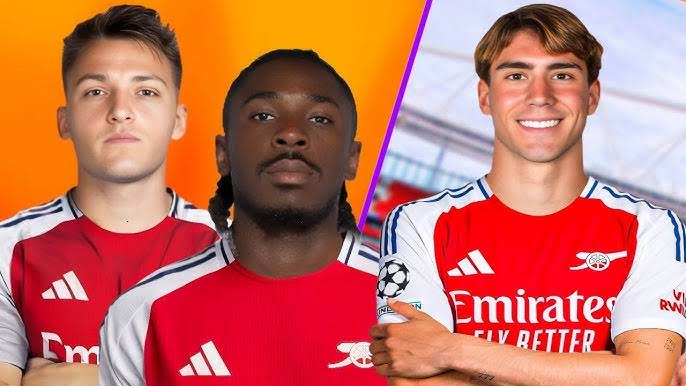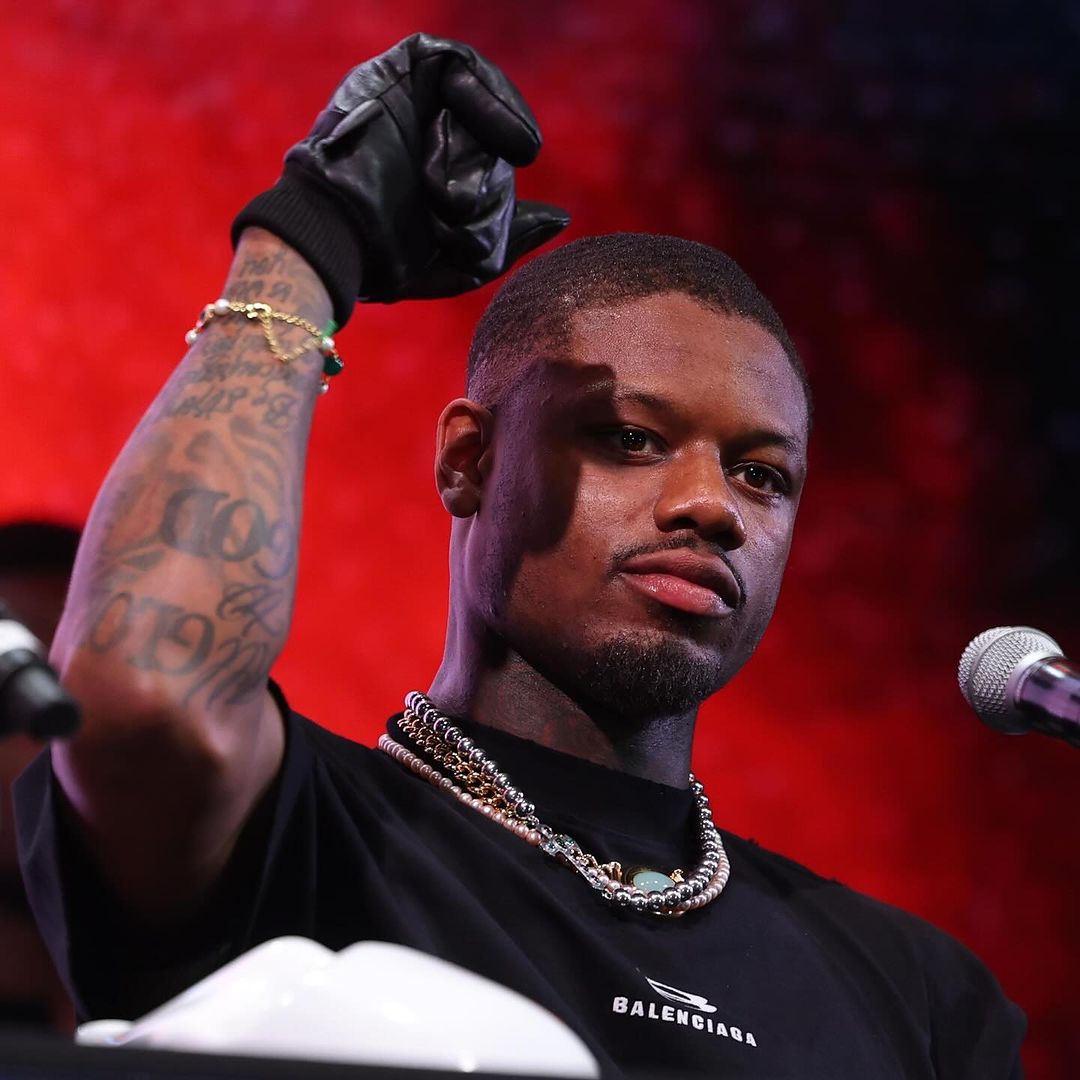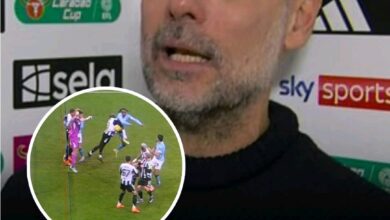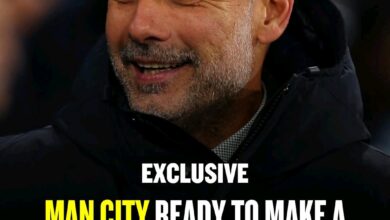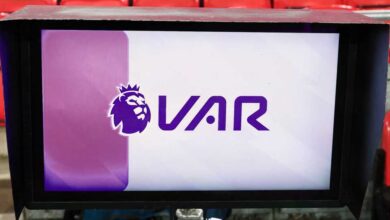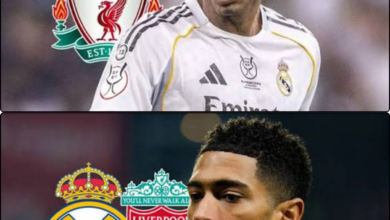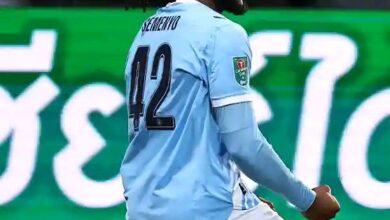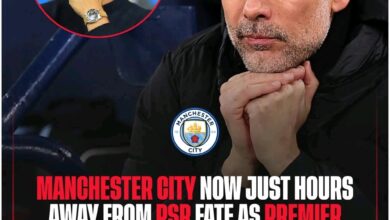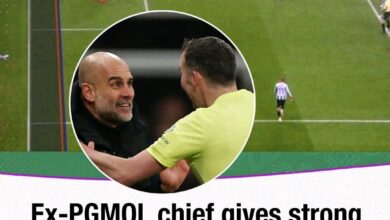Man City Have Made ‘Contact’ With £49M Rated Spanish Ace But 2 PL Rivals Are ‘Front Of The Queue’ To Sign Him
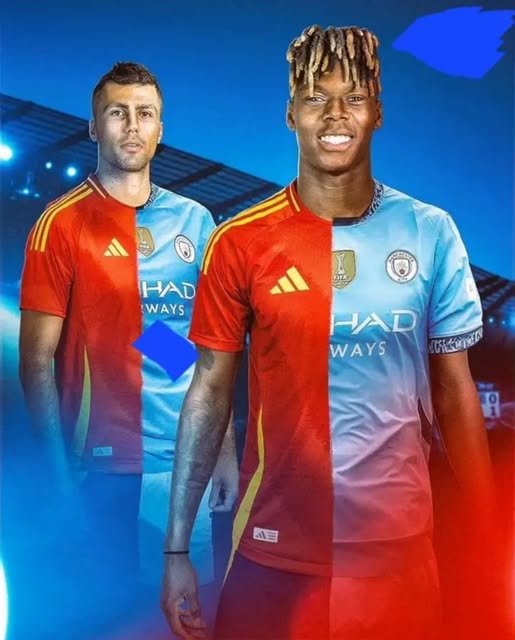
In the intricate chess game that defines modern football transfers, Manchester City have made their opening move in what promises to be one of the summer’s most compelling transfer sagas. The reigning Premier League champions have reportedly established contact with the representatives of Nico Williams, Athletic Bilbao’s electrifying Spanish international winger, whose €58 million release clause has attracted attention from across Europe’s elite clubs.
The 22-year-old has emerged as one of the most coveted talents in European football, combining pace, technical ability, and tactical intelligence in a package that has made him indispensable to both club and country. His performances for Athletic Bilbao and Spain have not gone unnoticed, with his representatives making it abundantly clear that the player would be receptive to a move to the Premier League should circumstances align favorably.
According to reports from TBRFootball, Manchester City’s interest represents part of a broader English invasion for Williams’ signature, with Newcastle United also having made preliminary contact. However, the landscape becomes significantly more complex when considering that Arsenal and Chelsea are reportedly positioned at the “front of the queue” for the Spanish winger’s services, setting up what could be a fascinating three-way battle between some of the Premier League’s most ambitious clubs.
The Player: Nico Williams Deconstructed
To understand why Manchester City have identified Nico Williams as a potential transfer target, one must first examine the qualities that have made him one of Europe’s most sought-after young talents. Born in Pamplona to Ghanaian parents, Williams represents the modern archetype of the versatile, dynamic winger who can impact games through multiple channels.
Standing at 5’10”, Williams possesses the ideal physical profile for the contemporary game – tall enough to compete aerially but agile enough to navigate tight spaces and beat defenders in one-on-one situations. His pace is perhaps his most obvious attribute, with the ability to stretch defenses and create space both for himself and his teammates through intelligent off-the-ball movement.
However, what separates Williams from many pace-dependent wingers is his technical sophistication and tactical intelligence. His first touch is consistently clean, his passing range impressive for a wide player, and his decision-making in the final third has improved markedly over recent seasons. These qualities have made him not just a threat in transition but also effective in possession-based systems that require wingers to contribute to buildup play.
Williams’ versatility adds another dimension to his appeal. While primarily deployed on the left wing for Athletic Bilbao, he has demonstrated the capability to operate effectively on the right flank and even in more central attacking midfield roles when tactical situations demand flexibility. This adaptability is particularly valuable in the modern game, where squad depth and tactical versatility can prove decisive across long, demanding seasons.
His international experience with Spain has further enhanced his reputation. Having represented his country at various youth levels before earning senior caps, Williams has consistently performed on the biggest stages, demonstrating the mental fortitude and technical consistency required to excel at the highest level of international football.
Athletic Bilbao: The Unique Challenge
Any discussion of Williams’ potential transfer must acknowledge the unique context of Athletic Bilbao, a club whose transfer policy and cultural identity create complications that don’t exist elsewhere in European football. Athletic’s famous policy of only fielding players of Basque origin has created a distinctive team identity and an incredibly strong connection between players and the local community.
For Williams, this connection runs particularly deep. Both he and his older brother Iñaki came through Athletic’s renowned academy system, making their professional debuts with the club and establishing themselves as key players in the first team. The younger Williams has become not just a player for Athletic but a symbol of the club’s ability to develop and nurture talent from within their unique cultural framework.
This emotional and cultural connection creates a natural resistance to departure that doesn’t exist in traditional transfer scenarios. While financial incentives and career ambitions might typically drive a player’s decision-making process, Williams must also consider his role as a representation of Athletic’s values and his responsibility to a community that has invested heavily in his development.
The club’s current position in La Liga adds another layer of complexity to any potential transfer. Athletic Bilbao currently occupy fourth place in the Spanish league table, sitting three points ahead of Villarreal with just three fixtures remaining in the season. Champions League qualification would represent a significant achievement for the club and could provide Williams with the high-level European competition that might otherwise only be available through a transfer to a larger club.
Should Athletic secure Champions League football for next season, the argument for Williams to remain in Bilbao becomes significantly stronger. The opportunity to represent his boyhood club in Europe’s premier competition while continuing to develop in familiar surroundings could outweigh the attractions of a move to England, regardless of the financial incentives on offer.
Manchester City’s Strategic Interest
Manchester City’s interest in Nico Williams must be understood within the broader context of their current squad composition and future strategic planning. Under the guidance of new Director of Football Hugo Viana, who replaced Txiki Begiristain, the club is embarking on a period of strategic refresh that aims to maintain their competitive edge while preparing for future challenges.
The club’s current wide options present a mixed picture of established quality and emerging uncertainty. While players like Bernardo Silva, Phil Foden, and Jeremy Doku have provided excellent service in wide areas, questions remain about squad depth and the long-term viability of certain positions. Jack Grealish’s reduced role this season has fueled speculation about his future, with rumors suggesting a potential departure during the summer transfer window.
Grealish’s situation exemplifies the challenges facing modern elite clubs in managing expensive, high-profile players who may no longer fit the tactical vision or performance standards expected. The English winger’s limited playing time this campaign has raised questions about whether his skill set aligns with Pep Guardiola’s current tactical preferences, particularly in high-pressure situations where defensive work rate and tactical discipline are prioritized.
Oscar Bobb’s injury problems add another dimension to City’s wing considerations. The young Norwegian, who had shown considerable promise and was expected to play an increased role this season, has seen his development stunted by persistent fitness issues. While the club remains optimistic about his long-term potential, his injury history creates uncertainty about his availability and contribution in the immediate future.
These circumstances create a compelling case for City to pursue additional wide options, particularly players who can provide both immediate impact and long-term value. Williams fits this profile perfectly, offering the combination of proven performance at the highest level, significant room for further development, and the versatility to adapt to different tactical systems.
From a strategic perspective, Williams’ age profile aligns with City’s preference for acquiring players who can contribute immediately while retaining substantial resale value. At 22, he represents an investment in both present and future, with the potential to serve the club for many years while maintaining or even increasing his market value.
The Premier League Competition
Manchester City’s pursuit of Williams takes place against the backdrop of intense competition from Premier League rivals, with Arsenal and Chelsea reportedly leading the race for his signature. This three-way battle reflects the broader competitive landscape of English football, where the wealthiest clubs increasingly compete for the same elite talents.
Arsenal’s interest in Williams appears particularly strategic, with Mikel Arteta’s system placing significant emphasis on width and pace in the final third. The Gunners have successfully integrated young wingers in recent seasons, with players like Bukayo Saka and Gabriel Martinelli becoming central to their tactical approach. Williams could provide additional options in wide areas while offering the kind of profile that fits Arsenal’s renewed focus on combining youth with experience.
The Spanish connection could prove advantageous for Arsenal, with Arteta’s understanding of Spanish football culture and tactical preferences potentially making the club an attractive destination for Williams. Additionally, Arsenal’s recent trajectory as serious contenders for major honors could appeal to a player seeking to compete at the highest level while continuing his development.
Chelsea’s position in the race reflects their continued commitment to acquiring young talent with significant potential for appreciation. Under their current ownership structure, the Blues have demonstrated willingness to invest heavily in players who fit their long-term strategic vision, even when immediate first-team opportunities might be limited.
The London club’s recent track record with young wingers presents a mixed picture that could influence Williams’ decision-making process. While players like Christopher Nkunku and Mykhailo Mudryk have struggled to establish themselves consistently, others have thrived in Chelsea’s environment. The club’s tactical evolution under their current management structure could provide opportunities for a player of Williams’ profile to make an immediate impact.
Newcastle United’s reported interest adds another dimension to the English pursuit, though their position as outsiders in this particular race reflects the financial and sporting realities that continue to separate the established elite from ambitious challengers. While Newcastle’s Saudi-backed ownership provides significant financial resources, their current absence from European competition and the time required to establish themselves among Europe’s elite makes them a less attractive proposition for a player of Williams’ caliber.
Tactical Fit and Integration
The question of how Williams would integrate into Manchester City’s tactical system represents one of the most intriguing aspects of this potential transfer. Pep Guardiola’s approach to wide players has evolved considerably during his time at the Etihad Stadium, with different phases of his tenure emphasizing different qualities and roles for wingers.
In City’s current tactical setup, wide players are expected to contribute across multiple phases of play, from high pressing in defensive transitions to intricate combination play in possession-based attacks. Williams’ profile suggests strong compatibility with these requirements, particularly his combination of pace for defensive pressing, technical ability for possession-based play, and direct running for transitional attacks.
Guardiola’s historical approach to integrating new wide players provides encouraging precedents for Williams’ potential adaptation. The Spanish manager has demonstrated remarkable success in helping wingers understand and execute complex tactical roles while retaining the individual qualities that made them attractive targets initially.
Williams’ experience in La Liga could prove advantageous in adapting to Guardiola’s tactical demands. Spanish football’s emphasis on technical precision, tactical discipline, and positional intelligence aligns closely with the requirements of City’s system. Players who have succeeded in Spain often possess the foundational understanding necessary to thrive under Guardiola’s management.
The specific role Williams might occupy in City’s system would likely depend on several factors, including the composition of the rest of the squad and the tactical evolution Guardiola implements for the upcoming season. His versatility across multiple wide positions provides tactical flexibility that could prove valuable in different competitive contexts.
Financial Considerations and Market Dynamics
The financial aspects of any potential Williams transfer reveal the complex economics that drive modern football transfers. His €58 million release clause represents a significant but not unprecedented investment for a club of Manchester City’s resources, particularly when considered against the backdrop of recent transfer market inflation.
From a purely financial perspective, Williams represents potentially excellent value in the current market. Comparable players of similar age, ability, and potential have commanded significantly higher fees in recent transfer windows, suggesting that his release clause could represent something of a bargain for acquiring proven quality with substantial room for appreciation.
The structure of release clauses in Spanish football creates unique dynamics that could benefit potential purchasers. Unlike negotiated transfer fees, which can involve complex payment structures and additional variables, release clauses typically require immediate payment of the full amount, simplifying the transaction process but requiring significant upfront investment.
For Manchester City, the financial commitment required for Williams must be balanced against other transfer priorities and the club’s overall strategic spending plans. With positions such as central midfield and right-back identified as higher priorities, any move for Williams would need to fit within a broader transfer strategy that addresses multiple squad needs.
The potential departure of Jack Grealish could significantly impact the financial calculations surrounding Williams’ acquisition. Any transfer fee received for Grealish would help offset the cost of bringing in Williams, while also freeing up wage budget that could be redirected toward the new signing.
The Spanish Connection and Cultural Factors
Williams’ Spanish nationality and La Liga experience create interesting cultural and sporting dynamics that could influence his decision-making process. For a player who has spent his entire career in Spain, the transition to English football would represent a significant cultural and professional adjustment.
However, several factors could ease this transition if he were to choose Manchester City. The club’s Spanish connections, primarily through Pep Guardiola and several Spanish-speaking players in the squad, could provide a supportive environment for adaptation. Guardiola’s understanding of Spanish football culture and player development could prove particularly valuable in helping Williams maximize his potential.
The presence of players like Rodri, who made a similar transition from Spanish to English football, could provide valuable mentorship and guidance. These existing relationships and cultural connections often prove crucial in helping international players adapt to new environments and maintain their performance levels during transition periods.
The broader Spanish football community in Manchester and the Premier League could also provide support networks that extend beyond the club itself. The success of Spanish players in English football over recent decades has created pathways and precedents that could reassure Williams about the viability of such a move.
International Career Implications
Any transfer decision Williams makes will inevitably impact his international career with Spain, where competition for places in wide positions remains intense. The Spanish national team’s depth in attacking positions means that maintaining high-level club performance is essential for securing and retaining a place in the squad.
A move to Manchester City could theoretically enhance his international prospects by providing exposure to the highest levels of European competition and the tactical sophistication that comes with playing under Guardiola. However, this would need to be balanced against the guarantee of regular playing time, which might be more readily available at other clubs or by remaining at Athletic Bilbao.
Spain’s tactical approach under their current management shows strong similarities to City’s system, potentially making the transition beneficial for Williams’ international development. The emphasis on possession-based play, high pressing, and tactical flexibility aligns closely with the requirements of both club and country.
The timing of any potential transfer could also impact his international standing, with major tournaments and qualifying campaigns potentially influencing his decision-making process. Players often prioritize stability and regular playing time in periods leading up to significant international competitions.
Academy Impact and Development Philosophy
Williams’ journey through Athletic Bilbao’s academy system provides valuable insights into his character, work ethic, and potential for further development. The club’s reputation for producing technically excellent, tactically intelligent players suggests that Williams possesses the foundational qualities necessary to succeed at the highest level.
Athletic’s academy philosophy emphasizes not just technical development but also mental fortitude, tactical understanding, and professional discipline. These qualities often prove crucial in determining whether young players can successfully transition to more demanding environments and maintain their development trajectory.
For Manchester City, Williams’ academy background could be particularly appealing given their own commitment to youth development and long-term player growth. The club’s track record of successfully integrating academy products and young signings suggests an environment conducive to continued development.
The comparison between different academy philosophies and development approaches could influence how quickly Williams adapts to City’s environment. The similarities between Spanish and English football development, particularly at the elite level, could facilitate a smoother transition than might be expected for players from other football cultures.
Market Position and Timing
The timing of Manchester City’s interest in Williams reflects broader trends in the transfer market and the strategic considerations that drive major clubs’ recruitment decisions. The identification of targets well in advance of transfer windows allows clubs to conduct thorough due diligence and develop comprehensive acquisition strategies.
Williams’ market position as one of Europe’s most promising young wingers means that any delay in pursuing his signature could result in increased competition or escalating costs. The current economic climate in football, with many clubs facing financial constraints, could provide an opportunity for well-positioned clubs like City to secure elite talent at relatively reasonable prices.
The relationship between Athletic Bilbao’s European qualification hopes and Williams’ transfer availability creates a specific timeline that could influence negotiations. Should Athletic secure Champions League football, the dynamics change significantly, potentially increasing the cost and complexity of any deal.
Long-term Strategic Vision
Manchester City’s interest in Williams should be understood within their broader strategic vision for squad development and competitive sustainability. The club’s approach to transfers has increasingly emphasized acquiring players who can contribute across multiple seasons while maintaining or increasing their market value.
Williams fits this profile perfectly, offering the combination of immediate impact potential and long-term value retention that defines successful recruitment in modern football. His age, ability level, and contract situation create an opportunity to secure a player who could serve the club’s interests for many years.
The strategic value of acquiring promising wingers has been demonstrated repeatedly in recent transfer markets, where such players have commanded increasingly high fees. Early identification and acquisition of such talents can provide both competitive advantages and financial benefits over the medium to long term.
Conclusion: The Decision Point Approaches
As the summer transfer window approaches, the pursuit of Nico Williams represents one of the most intriguing storylines in European football. Manchester City’s reported contact with his representatives signals their serious intent to secure his services, but the competition from Arsenal and Chelsea ensures that any potential deal will require careful navigation of complex sporting, financial, and personal factors.
For Williams himself, the decision represents a career-defining moment that will influence not just his immediate future but his long-term trajectory as a professional footballer. The choice between remaining at Athletic Bilbao, where he enjoys emotional connections and cultural comfort, or pursuing new challenges in the Premier League reflects the broader tensions that define modern football careers.
The coming weeks will reveal whether Athletic’s potential Champions League qualification changes the dynamics of this situation, and whether Manchester City’s tactical appeal and strategic vision can overcome the advantages held by their Premier League rivals. What remains certain is that Williams represents the kind of talent that can transform squad dynamics and provide the tactical flexibility that modern elite clubs require.
In a transfer market increasingly defined by strategic patience and long-term planning, Manchester City’s pursuit of Williams demonstrates their commitment to maintaining competitive excellence while preparing for future challenges. Whether this pursuit ultimately proves successful will depend on factors ranging from tactical fit to cultural adaptation, but the club’s interest signals their recognition that securing elite young talent remains fundamental to sustained success at the highest level of football.
The Nico Williams transfer saga embodies everything that makes modern football compelling: tactical sophistication, strategic planning, cultural complexity, and the human elements that ultimately determine where careers unfold. As Manchester City navigate this pursuit alongside their Premier League rivals, the outcome will provide valuable insights into how elite clubs position themselves for success in an increasingly competitive landscape.

